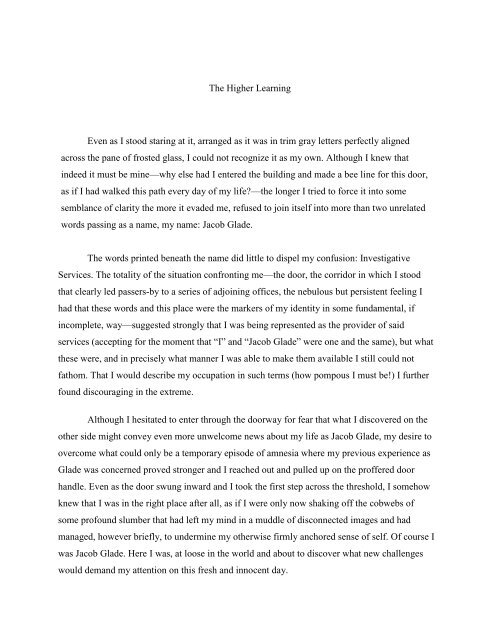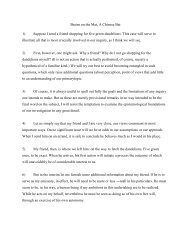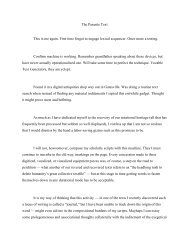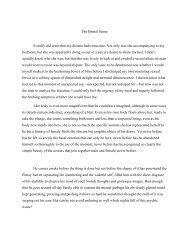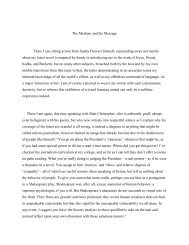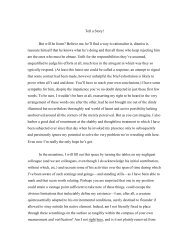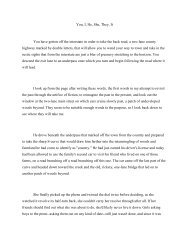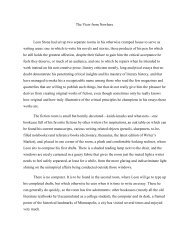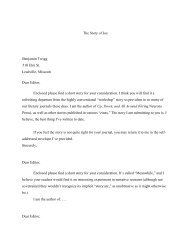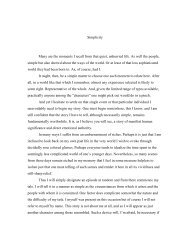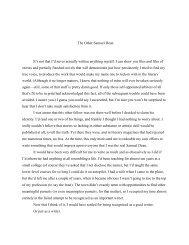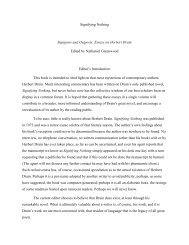You also want an ePaper? Increase the reach of your titles
YUMPU automatically turns print PDFs into web optimized ePapers that Google loves.
<strong>The</strong> <strong>Higher</strong> <strong>Learning</strong><br />
Even as I stood staring at it, arranged as it was in trim gray letters perfectly aligned<br />
across the pane of frosted glass, I could not recognize it as my own. Although I knew that<br />
indeed it must be mine—why else had I entered the building and made a bee line for this door,<br />
as if I had walked this path every day of my life?—the longer I tried to force it into some<br />
semblance of clarity the more it evaded me, refused to join itself into more than two unrelated<br />
words passing as a name, my name: Jacob Glade.<br />
<strong>The</strong> words printed beneath the name did little to dispel my confusion: Investigative<br />
Services. <strong>The</strong> totality of the situation confronting me—the door, the corridor in which I stood<br />
that clearly led passers-by to a series of adjoining offices, the nebulous but persistent feeling I<br />
had that these words and this place were the markers of my identity in some fundamental, if<br />
incomplete, way—suggested strongly that I was being represented as the provider of said<br />
services (accepting for the moment that “I” and “Jacob Glade” were one and the same), but what<br />
these were, and in precisely what manner I was able to make them available I still could not<br />
fathom. That I would describe my occupation in such terms (how pompous I must be!) I further<br />
found discouraging in the extreme.<br />
Although I hesitated to enter through the doorway for fear that what I discovered on the<br />
other side might convey even more unwelcome news about my life as Jacob Glade, my desire to<br />
overcome what could only be a temporary episode of amnesia where my previous experience as<br />
Glade was concerned proved stronger and I reached out and pulled up on the proffered door<br />
handle. Even as the door swung inward and I took the first step across the threshold, I somehow<br />
knew that I was in the right place after all, as if I were only now shaking off the cobwebs of<br />
some profound slumber that had left my mind in a muddle of disconnected images and had<br />
managed, however briefly, to undermine my otherwise firmly anchored sense of self. Of course I<br />
was Jacob Glade. Here I was, at loose in the world and about to discover what new challenges<br />
would demand my attention on this fresh and innocent day.
Once I had gained complete admittance it took only a momentary glance around the<br />
premises to confirm that I had entered my place of work, an office I had rented immediately<br />
upon the construction of this building almost three years earlier. <strong>The</strong> centerpiece of a larger<br />
complex of shops, restaurants, and additional, more modest, office space, the Sternwood<br />
Business Center had been ballyhooed as a symbol of this town’s growing prosperity, a signal to<br />
the rest of the state that it was a community on the move. Unfortunately, the hype never<br />
materialized into reality, and when the building was completed most of its available space had<br />
not yet been claimed. (Even now only a few of the shops in the surrounding Sternwood Plaza<br />
have tenants, and only one of the restaurants that did open is still in business.) This proved to be<br />
a boon for me, however, because the remaining unoccupied offices were offered up at a<br />
considerable discount—low enough that even a tenderfoot private detective could manage to find<br />
himself a home.<br />
And I did feel at home, standing there in the entranceway, contemplating the familiar<br />
features of my agreeably capacious, if not exactly impeccably decorated digs: to the left, a<br />
modest waiting area for my clients and would-be clients (complete with complementary reading<br />
copies of <strong>The</strong> New Yorker, the Times Literary Supplement, and American Poetry Review); to the<br />
right, an inner door opening on to my private office, where I and those clients discuss the<br />
business they wish me to undertake; and directly in front of me, my receptionist’s station, fully<br />
equipped with all the devices needed to help keep such an enterprise as mine up and running—<br />
although, being something of a Luddite myself, I do not get much involved in either the<br />
purchasing or the operation of these machines. This I leave to my receptionist, who just now has<br />
looked up in response to my arrival and who, it now seems necessary for me to say, has been<br />
indispensable in making what at first promised to be no more than a caprice, almost a kind of<br />
literary conceit I hoped to make into reality, the modest success it has in fact become.<br />
“Where the hell have you been?”<br />
I am halted in my tracks by this outburst. What I had taken as an incipient smile of<br />
greeting from my receptionist has turned instead into this sharp snarl of annoyance.
“According to the clock above your head there, Gretchen”—for this was the young<br />
woman’s name—“it is 9:15. While I will admit to being somewhat tardy, the extra fifteen<br />
minutes hardly seems to merit such apparent hostility.”<br />
“You know damn well what I’m talking about,” she replies. She pauses, presumably to<br />
wait for me to acknowledge that indeed I do know the subject of her displeasure, but the<br />
blankness of my expression must successfully convey my inability to grasp the substance of her<br />
remark, since she now sighs audibly and turns to her computer, its well-known insignia, a piece<br />
of fruit, prominently visible as I continue to watch impassively.<br />
While I was now intensely curious to know precisely what had made Gretchen so upset, I<br />
concluded it was in my best interest to let the matter drop and get on with the day’s activities.<br />
Gretchen was a mercurial personality, to say the least, and by lunchtime she would no doubt<br />
have forgotten the whole episode—although by that time something else might easily arise to<br />
kindle her ire. (Not that she was always angry at me. Far from it. Even as I made my way into<br />
my inner office to avoid prolonging the current encounter, I recalled how almost from the day<br />
she showed up to apply for the job (I myself had only moved in the day before) Gretchen had<br />
seemed to regard it as more than a job, and me as more than her employer. (<strong>The</strong>re is nothing<br />
about me, I must add, that would ordinarily be attractive to women. (At least as far as I am able<br />
to judge such things.) Before I decided to set myself up as a private detective, in fact, I had only<br />
rarely been out on a date, and certainly had never had what is called a “relationship” with any<br />
woman.) (Although I can assure you that I do indeed “like” women.)) If I was lucky, we’d get<br />
some new business this morning, and her attention would be focused on sizing up our potential<br />
clients and not on nursing a grudge and planning an ingenious way to remind me how mistaken I<br />
would be to take her for granted.<br />
Once inside my office, I paused a few moments to adjust to its dimness. It was equipped<br />
with the same fluorescent lighting that kept Gretchen’s station brightly illuminated, but I recoiled<br />
from the harshness of the light thus produced and never used the ceiling units, relying instead on<br />
a floor lamp placed between my desk and a La-Z-Boy recliner I had brought in for use when in<br />
the course of my duties I was required simply to read for extended periods of time. (This was an
aspect of the job that initially took me somewhat by surprise, but, given my background,<br />
pleasantly so, especially when through careful reading I might glean information that helped me<br />
bring a case to a successful conclusion.) (Only just the day before, as a matter of fact, I had been<br />
sitting in this chair reading, as it happened, an article in the latest issue of Studies in Postmodern<br />
Surveillance (Vol. 12, No. 4) that helped me understand how I might interpret a puzzling<br />
observation I had made on a recent job. Using some of the findings of quantum physics, the<br />
article suggested that the presence of an observer in a given situation—say an unfolding<br />
adulterous event—has an unavoidable effect on the reality base of the phenomenon under<br />
reconnaissance. In other words, had the observer not been present, the “facts” as they appeared to<br />
be might actually have been quite otherwise. Thus, what I thought I had seen on the job in<br />
question—not what I had wanted to see at all—might indeed have really been just the opposite,<br />
and so I could report to my client.) This subdued lighting, along with the deep-blue, all-natural<br />
fiber throw rug placed in the center of the room and the bookcases lining the walls, gives the<br />
office a very studious feel that is, I have to admit, not in the least accidental.<br />
Anyone looking over the books tightly packed into these bookcases would have to<br />
conclude I am no ordinary shamus, the sort who was once a police officer but had trouble taking<br />
orders or grew impatient with filling out forms and filing reports, who still thinks like a police<br />
officer and whose fondest desire is to come across the case that will allow him to demonstrate he<br />
is nothing if not a tough guy, a brawler on behalf of the Truth, to indulge his innate propensity<br />
for violence, that feral and furious instinct his former colleagues had glimpsed more than once,<br />
provoking in them both awe and outright horror, who manages to solve the puzzles in which he<br />
becomes entangled not through his superior brain power but through his ability to bludgeon his<br />
way to the end. Certainly not the sort, on the other hand, who in college studied “criminology”<br />
and learned to think of the private investigator as a “professional” like any other, who became<br />
enamored of all the technological trinkets that have made some p.i.s into little more than<br />
extensions of their electronic apparatuses and their digital doodads, or who regard their work as<br />
“scientific,” merely a matter of applying well-known methods and tested techniques to whatever<br />
familiar problems present themselves. A survey of these books would reveal instead a man of<br />
subdued habits and a reflective temperament, educated not in the arid expertise of the technician,<br />
but in the higher learning of art, literature, and philosophy.
(<strong>The</strong> first few titles, top shelf, bookcase to my immediate left: <strong>The</strong> Outwardness of<br />
Inwardness, by Merrill Budd; A <strong>The</strong>ory of Knowing, by Rolf Johnson; Selected Essays, by<br />
Walter Evans Morrow; Structuralist Poetics, by Pierre Mondieu; <strong>The</strong> Tyranny of the Visual in<br />
Modern Art, by Daphne Muldoon.)<br />
Several clients have in fact declared they feel themselves to be meeting a professor<br />
during his office hours rather than a private detective who’s charging them a sizable sum for<br />
every bit of information he is able to gather. (Unlike my counterparts in detective fiction, I’m not<br />
about to reveal how sizable. Some might think it outrageous, others pitifully small considering<br />
that I’m only a dissertation away from possessing a Ph.D. (But then how much do professors<br />
make? Especially literature professors? After all, we don’t live in a society that forks over lots of<br />
money for lectures on free verse.) I will say I make enough to live comfortably in a town like<br />
this.) Such comments—although I cannot deny their appeal to my vanity—which in turn I cannot<br />
deny I possess—never fail also to provoke a slight—sometimes more than a slight—twinge of<br />
regret. I had after all set out to be a professor, would be one now had my pursuit of the doctoral<br />
degree not run aground on the shoals of a finally unmanageable writer’s block. <strong>The</strong>re are those<br />
who knew me then who even now will insist that this obstacle was itself a product of certain<br />
other weaknesses to which I was unfortunately prone—drink, for one (I will admit to having<br />
spent more than my share of time at <strong>The</strong> Flagon O’ Sack, a local watering hole in that college<br />
town frequented largely by graduate students of the not overly studious type), but also an<br />
unfortunate and inherent tendency to procrastinate, to put off unpleasant tasks until later in favor<br />
of more immediately rewarding activities. (I do not admit to this latter vice, however much it<br />
seems a corollary of the first; my desire to be thoroughly prepared before embarking on any<br />
difficult project simply exceeded my capacity to plod ahead, leaving the quality of the result to<br />
take care of itself.)<br />
I am finally seated at my desk, ready to peruse the folders that Gretchen has so efficiently<br />
placed there, when everything goes black. It’s not just that the dim lighting goes even dimmer—<br />
there is no light at all, I suddenly find myself drenched in darkness so total the very idea of light<br />
seems a hopeless fantasy. It is the sort of darkness one imagines would obtain as one crossed the<br />
event horizon around a black hole—if it were possible to survive such a crossing without having
one’s atoms pulverized into quantum bits by the horrific gravitational force one would encounter<br />
there—such an utter absence of illumination that only the choking off of light rays before they<br />
can even be said to exist could explain the depths of night into which one has fallen. I have read<br />
that at the heart of every galaxy there may be a black hole, and thus are we all (indeed is all of<br />
existence) inevitably swirling toward a final obliteration in the maw of these unfathomable<br />
depths. I have experienced such episodes before, in fact have been prey to them for as long as I<br />
can remember—as have I to those curious lapses in memory of the kind (I now recall) with<br />
which this narrative began. Gretchen believes I should consult a specialist—what kind? a<br />
neurologist? a shrink? an astrophysicist?—but as they seem to leave no lasting disability, and<br />
pass away as quickly as they arrive, I have chosen to endure them without fuss or bother. <strong>The</strong>y<br />
have not interfered with my work, although I must confess they sometimes leave me in what I<br />
can only call a state of existential displacement.<br />
Such as now. When I am returned to the world of appearances I am still sitting at my<br />
desk, but I find myself staring across at an astonishingly attractive older woman (at least she is<br />
older than I) who presumably has just spoken to me, since she is staring back in that open-eyed<br />
way that suggests she is expecting a reply. Recognizing that I was experiencing another of my<br />
“episodes,” as Gretchen likes to call them, and that to admit my confusion could only cause the<br />
lady—about whom I wished to know more about, by all means—to wonder about my stability, I<br />
asked her if she could repeat what she had said.<br />
She told me she would appreciate it greatly if I could tell her where she came from.<br />
Although I would acknowledge that her manner of phrasing this request was somewhat<br />
peculiar—was I being asked to explain the facts of life to this seemingly mature woman—a<br />
woman, moreover, who, from what I was seeing, signaled from every part of her body a<br />
thorough acquaintance with every one of the facts, including, I was sure, some whose existence<br />
eluded me—?—I had taken on enough such cases to know what she was asking me to do: she<br />
wanted me to uncover the truth about her begetting, the mystery of her parentage, which she only<br />
recently had discovered did not include the individuals she had always assumed to be involved.<br />
(In more demotic lingo: the people she had always called mommy and daddy were, in fact,
neither.) In some ways her situation—ostensible parents now both deceased, the secret they had<br />
hidden for so long now revealed—was unusual. Most people who want to track down their<br />
biological parents have learned much earlier—from more candid adoptive parents—that they are<br />
not the natural offspring of those who have raised them and are thus much younger than the lady<br />
in question—she was probably about 45 (but at the stage in a woman’s life when her now more<br />
chiseled features, deprived finally of the lingering baby fat of her youth, but not yet succumbed<br />
to the gaunt boniness of old age, only make her seem more vigorous, more eager to enjoy the<br />
fruits of her experience). Most also are at great pains to impress upon me the utter importance of<br />
accomplishing this mission, suggesting if not asserting outright that their stake in a successful<br />
outcome amounted to no less than the validation of their very identities (which is, in the most<br />
literal sense, of course perfectly true.) (Whether the mere knowledge of one’s progenitors<br />
confers any deeper understanding of one’s own underlying nature is a different story altogether,<br />
one I have attempted to examine with such clients in the past, to little avail. After all, isn’t what<br />
one does with one’s life more important than knowing the precise means of its creation?)<br />
But this lady—she had informed in the course of our conversion that her name was<br />
Serena Webb, the name I assumed she had been given upon her adoption—seemed to regard the<br />
possibility I might find what she was looking for with trepidation, as if, I thought, she knew that<br />
she must attempt to solve the puzzle of her origins but feared that the picture thus exposed might<br />
not be altogether pretty to look at. (Unlike the lady herself, whose attractions were apparently so<br />
capable of absorbing my attention that she caught me staring at her legs, that part of a woman’s<br />
anatomy I have always found most distracting, although in her case the limbs in question were<br />
without a doubt among the most awe-inspiring I had ever had the chance to ogle. My own hands<br />
were beginning to tremble, which may have been what most immediately drew her notice. “Am I<br />
making you uncomfortable?” she asked me. <strong>The</strong>re was no irony, no mischief, no hidden<br />
annoyance in her question. She seemed perfectly aware of the entrancing charms of her person<br />
and was therefore sincerely concerned I might be succumbing to them. “By no means,” I said.<br />
“Your situation arouses my curiosity. I believe I could be of assistance to you in uncovering<br />
those secrets you now wish to be revealed.”)
“I have chosen to solicit your services, Mr. Glade, through the recommendation of a<br />
mutual acquaintance (I shall not divulge her identity at this time) who assures me you are a<br />
determined seeker of the truth. ‘He views uncertainty as a personal affront’ is the way I believe<br />
she phrased it. Frankly, my own will is weak, Mr. Glade. I want someone who will persevere<br />
even in the face of my own hesitation.”<br />
I told her she should thank her confidant on my behalf for her kind words about me. (I<br />
think they were meant kindly. Was this “mutual acquaintance” a former client, or was she<br />
someone I had perhaps “seen,” as they say?) I said that I wasn’t sure I could live up to this<br />
reputation, but confirmed that I did approach my job with the utmost seriousness, regarded the<br />
idea of discovering the truth as far from silly, considered demonstrating it to be fully capable of<br />
being brought to fruition, in fact, as part of my calling.<br />
She nodded in apparent approbation of these remarks, and seemed moved to inquire<br />
further about the nature of my approach to the job.<br />
“I also hear,” she said, “that you have an unusual background for a private investigator.<br />
Might I possibly prevail upon you to fill me in about your. . . .”<br />
“About my life story? You wish to have a more complete view of me. To assuage any<br />
remaining doubts.”<br />
me.”<br />
She gave me an indulgent smile. “But only that which you feel comfortable disclosing to<br />
Was there anything I would have been unwilling to disclose to her?<br />
I told her about my original intention to live a life of the mind. About my years as a<br />
graduate student pursuing a doctoral degree in the analysis of literature and about the way in<br />
which I strayed into the shadows of lassitude and frustration.<br />
I told her about how I came to see the rigorous interpretation of literary texts—at which I<br />
was exceptionally proficient, as I believe even my harshest critics would have conceded—as a
species of detective work, a way of penetrating the filmy surfaces of things—in one case the<br />
artful arrangement of words, in the other the ongoing rush and superficial busyness of ordinary<br />
existence—to discover a whole new level of embedded meaning and veiled intent.<br />
Finally I told her about my lonely decision to abandon my academic ambitions and<br />
instead apply my abilities to the solution of real-life conundrums of the sort she was currently<br />
bringing to my attention. (I did not tell her of the skepticism with which this decision was<br />
greeted by my friends and acquaintances, almost all of whom thought I was destined to fail<br />
because I knew nothing about the job of a private investigator, or, more importantly, about the<br />
real world in general. Nor did I tell her of my own doubts and apprehensions on this score,<br />
doubts so profound that no sooner had I occupied these premises than I began contemplating a<br />
return to the university and to the dissertation that now seemed to block my way to some<br />
semblance of satisfaction with my lot like a load of human waste that had been dumped on the<br />
only road leading up a distant mountain pass. (Especially did I not tell her of my weakest<br />
moment, after recognizing I could not go back but before I was at last involved in a serious case<br />
brought by a legitimate client, my half-hearted attempt at self-extinction, a more or less<br />
spontaneous gesture that consisted of tying a rope around my neck and letting it remain there for<br />
the rest of the day until I decided conclusively I would never actually go through with it and<br />
returned the rope to the storage closet from which I had taken it. I can honestly say that never<br />
before had I fallen prey to the suicidal impulse, nor has it manifested itself again since that<br />
temporary loss of emotional control. If I were telling Ms. Webb about this episode, I would say<br />
in extenuation that I almost felt compelled to act as I did, as if, stuck as I was between the<br />
blighting of my earliest aspirations and even the faintest sign of success in my surrogate<br />
endeavor, I was only playing out the part assigned to one in such circumstances, although<br />
assigned by whom I certainly could not say.)<br />
This sense that my fate was being determined through some process to which I was not a<br />
party was if anything only heightened when shortly after sounding rock bottom in this fashion<br />
my office suddenly began to be filled with the enlivening presence of local citizens inquiring<br />
about my services. Perhaps a kind of critical mass of the curious had been reached, or perhaps I<br />
had actually been right that there might be a demand in this community after all for someone
with my talents, someone capable of uniting the known and the unknown and thus of helping the<br />
members of the community resolve the uncertainties that otherwise threatened to overwhelm<br />
them. Someone capable of reading the world as if it were a book and reducing its complexities<br />
through the application of a trained intelligence. Certainly those people now finally providing<br />
Gretchen with some assurance that her employer was not entirely a deadbeat would not have<br />
described the tasks they were hoping to set for me in quite these words, but I nevertheless took<br />
heart from the increased traffic outside my doors and could only interpret it as the<br />
encouragement I needed to try to put into practice those skills I knew myself to possess.<br />
Surprisingly enough, one of the first cases I chose to take on demanded I use those skills<br />
to an extent that even I could not have foreseen. It was what is commonly called a “cold case,” a<br />
crime perpetrated in the recent past that had never been solved; usually such a case, enough time<br />
having lapsed, never gets solved, what with police attention inevitably turning elsewhere and<br />
public interest in the case naturally waning, unless someone from outside, a sleuth like myself,<br />
for example, is brought in to take a fresh look at the evidence, track down previously neglected<br />
witnesses, or apply a different set of talents and assumptions. Given the nature of this crime and<br />
the clues left in its wake, it was fortuitous indeed that I was brought in to finally solve it. <strong>The</strong>se<br />
were the circumstances: A newly married couple had just returned from their honeymoon when<br />
the young bride suddenly turned up missing. <strong>The</strong> husband, as well as the bride’s parents, were<br />
certain she had been kidnapped, although they could not say exactly who might conceivably<br />
have a reason to abduct her. After searching for many months, the police concluded that she did<br />
not want to be found, that she had not been kidnapped at all but had run away—although they<br />
also could settle on no particular motive she would have had to do this. No note, no evidence of a<br />
forced abduction at all, had been discovered at the time of the bride’s disappearance, but a few<br />
months after the police had suspended their investigation the husband received the following<br />
letter, which I reprint here in full:<br />
Dear Mr. _____
Please be assured that your wife is unharmed, but also know that you will never see her<br />
again. She is perfectly happy in her new and frankly more rewarding life, and if she could speak<br />
to you one last time—which unfortunately she cannot—I’m sure she would tell you not to<br />
concern yourself with her present or future whereabouts but to instead try and get on with your<br />
own life. (On that score, a friendly suggestion to you: <strong>The</strong> life you have led up to now has been<br />
devoid of either interest or value. Your growth and development as a human being have become<br />
hopelessly static. Change your ways.)<br />
Do not attempt to trace this letter. It cannot be done. No evidence of our existence will be<br />
found along the avenue leading from this pen to your mailbox. (Even assuming that such an<br />
avenue was taken.) Accept that the direction in which your life appeared to be heading has been<br />
subjected to an unalterable detour. Navigate it with care. Nowhere is it written that your own fate<br />
cannot be irrevocably altered, that what seems to you the indelible impression made by the<br />
unfolding episodes through which your life progresses could not be erased as the meaningless<br />
scribble it may prove to be.<br />
<strong>The</strong> police officially interpreted this letter as a hoax, a cruel joke played on the grieving<br />
husband by someone in the community with a malicious sense of humor. Unofficially, I was<br />
informed, they believed it had actually been written by the husband himself. Either he was so<br />
desperate for the case to be revived that he wrote it to provide the police with new “evidence,” or<br />
he was so embarrassed that his wife had run away so soon after their wedding that he had to<br />
produce something to indicate that she had been the victim of foul play and not a fugitive from<br />
his own inadequacy. After carefully interviewing the husband, taking the measure of his<br />
sincerity, as it were, I could not agree with this conclusion. He had not written the note, and he<br />
was certain—and I came to share his certainty—that his wife had been seized. <strong>The</strong> letter proved<br />
to be correct about one thing, if nothing else: it was not possible to track down its author by<br />
conventional means. It had not been sent through the mail, so we had no way to trace its delivery<br />
back to a point of origin; nor were any fingerprints found on any part of the paper, and the<br />
typeface could not be identified as belonging to any known typewriter or printer that had ever
een merchandised. Thus any solution to this puzzling crime would have to arise from clues that<br />
might be found through a careful reading of the text.<br />
“Please be assured that your wife is unharmed,” it began. Why the solicitous “please”?<br />
Was this just a conventional way to commence such a message, or was the writer attempting to<br />
convey some real sympathy for the husband’s plight? And why would the writer offer assurance<br />
to the husband in the first place? Why not make the husband continue to harbor the fear that the<br />
wife was dead, if the act of taking her was indeed as capricious as it seemed to be? Why not<br />
inflict further pain by leaving the question of the wife’s condition unanswered, or at any rate by<br />
suggesting the writer’s indifference to the wife’s ultimate fate? Especially given the way the note<br />
includes a subtext of implied threat that breaks out into the explicit threat of the final line, why<br />
take the husband’s feelings into account at all? (<strong>The</strong>se threats further convinced me that the<br />
author was almost certainly male. But then kidnappers almost always are.) Further, if the<br />
husband had written the letter, why would he create a persona with this much good will?<br />
Wouldn’t he make the letter seem as vicious and cold-blooded as possible in order to make the<br />
police think there was a dangerous criminal on the loose? Why write such a patently peculiar<br />
letter that eventually urges its recipient to become a better person? I could only conclude that the<br />
true author of this letter had indeed made off with this man’s wife and for some as yet<br />
unaccountable reason had done her no harm—as a matter of fact felt he had done her a world of<br />
good.<br />
But what if the wife had not actually been forcefully removed at all? What if she had<br />
actually cooperated in her own abduction? Was that why the wife was said to be content in her<br />
altered circumstances, why she allegedly wanted nothing more to do with the husband, even if<br />
the husband could reliably believe she was still alive? Was “her new and frankly more rewarding<br />
life” simply one in which she and her apparent kidnapper were really runaway lovers, this note<br />
merely a cover for her own inability to confront the husband and tell him she had fallen for<br />
another man? Perhaps the wife herself had written the letter, preferring to disguise what was<br />
essentially a kiss-off by creating a fictional character, an authorial stand-in, to cushion the blow.<br />
But why not just speak in her own voice? What would she gain through such layering of<br />
discourse? Was the author merely playing games, or in the final analysis was it the case that the
narrator of this account was to be judged reliable after all? I chose to believe the latter, as did my<br />
client—although, of course, he had good reasons to interpret the text in a fashion most favorable<br />
to himself and his wife.<br />
<strong>The</strong> most important feature of this text, however, was, in my view, the exhortations to the<br />
husband to change his own behavior. At first glance it was difficult to understand why the<br />
husband’s well-being would be a concern to the author of the letter. Such solicitousness might<br />
add weight to the argument that the author could be the wife, expressing some lingering regard<br />
for the husband she was deserting, but the language employed seemed so aggressive—“Accept<br />
that the direction in which your life appeared to be heading has been subjected to an unalterable<br />
detour”—even belligerent—“<strong>The</strong> life you have led up to now has been devoid of either interest<br />
or value”—that I was convinced that what was presented as a friendly warning to the husband<br />
was in actuality a direct threat—but a threat to do what, and at whose discretion? <strong>The</strong>se were<br />
unanswerable questions, at least given the evidence before me, but I could, and did, advise my<br />
client that these threats should be taken seriously and thus he should reconcile himself to the<br />
finality of his wife’s disappearance: to do otherwise would only invite reprisals the nature of<br />
which he could not at all be sure.<br />
I must say, however, that at least two of the lines in this letter continue to haunt me. Try<br />
as I might, I could not decipher what they are supposed to mean. In paragraph 1: “Your growth<br />
and development as a human being have become hopelessly static.” And that final admonition:<br />
“Nowhere is it written that your own fate cannot be irrevocably altered,” etc. <strong>The</strong> metaphors here<br />
are certainly striking, but why has the author conveyed his message through such analogies with<br />
the composing process? Why address the husband as if he were himself a character in the<br />
author’s imagined, ongoing narrative? Was it evidence of megalomania, a man so carried away<br />
by the assumed omniscience of his discursive act that he truly believed in his own limitless<br />
dominion, or was it just a malicious delight in further belittling the husband, the author making it<br />
clear he considered this man no more than a puppet in a tawdry and disreputable stage show?<br />
My recitation seemed satisfactory to Ms. Webb, or so I could only surmise, as on rising<br />
to leave she extended her hand across my desk and urged me to keep her informed about the
progress of her case, preferably at regular intervals. I assured her that henceforth she would<br />
receive my most vigorous attention. (In truth, the prospect of seeing this woman again seemed<br />
suddenly to renew my sense of purpose, always dependent on my enthusiasm for the task<br />
immediately before me. Even now, the firm pressure of her confident, yet appealingly delicate<br />
hand in mine was doing much to rekindle that enthusiasm.) A deeply agreeable sense of wellbeing<br />
was beginning, in fact, to course its way along all of my sensorial pathways, until my new<br />
client opened the door to leave my office and I locked eyes with Gretchen, who was standing on<br />
the other side and staring at me with the balefulest look on her face I had ever seen. Suffice to<br />
say that the spreading warmth I had felt was instantly chilled, my limbs, mere seconds earlier<br />
newly animated by a fresh rush of anticipation, abruptly hardened into stone-like immobility.<br />
Even, I discovered, my powers of speech seemed to come under the spell of her gaze; I tried to<br />
instruct her to show Ms.Webb the way out, but the words would not come. Although I must<br />
admit Gretchen has often left me speechless, this instance was too literal for comfort, forcing me<br />
to conclude that her strange power over me—proceeding from a source mysterious to me (or that<br />
I did not want to explore, at any rate)—was no longer something I could tolerate. In the<br />
meantime, I managed to sink back down into my chair, but there I remained, as if rooted to the<br />
spot, until I could hear Gretchen make her evening’s exit from the office, many hours later.<br />
Having resolved that Gretchen must go, I could not bring myself to follow through on her<br />
dismissal. Instead, I remained sequestered inside my office for the next several days, arriving<br />
each morning before Gretchen normally came in to work and waiting each evening until she<br />
gave up on the possibility of flushing me out and stomped her way loudly out of the building. On<br />
two nights I chose to sleep in the office, using a tattered old sofa (inherited from my days as a<br />
graduate student, when I shared a house with three other students and at the end of which the<br />
rightful owner ceded all rights to this communal divan) I had brought in to serve in precisely this<br />
sort of pinch, out of fear Gretchen might try to phone me at home, or, worse, try to come there<br />
and berate me for my display of pusillanimity. (Or, God forbid, want to duplicate the outcome of<br />
our most recent such confrontation, when her outrage at me had metamorphosed not merely into<br />
the frenzied sexual demands to which I have long since reconciled myself, but into outright<br />
sadomasochism (how surprised I was when she pulled the set of chains from the plastic bag she
had brought with her!), the blood left behind on my bedroom wall a continuing reminder to me<br />
of my contemptible inability to foreswear the sexual availability of any willing female, no matter<br />
how joyless the encounter or dysfunctional the subsequent relationship.) During working hours I<br />
kept my inner office door locked, and if Gretchen tried to get me on the phone I quickly hung it<br />
back up if it was clear she merely wanted to interrogate me. (“What kind of f***ing bull-bleep<br />
are you trying to put over on me?” were among the mildest of her words.)<br />
If nothing else, my attempts to avoid contact with my secretary did allow me to begin<br />
preparing a strategy for the Serena Webb case. (Truth be told, ever since Ms. Webb’s visit I had<br />
been thinking about nothing else except how I could most effectively put my talents to work in<br />
bringing her case to a satisfactory conclusion. That in focusing my attention on the service I<br />
could provide to Ms. Webb—and on eluding Gretchen—I might be missing out on other clients<br />
who were trying to get through to me was risk I was willing to take.) I didn’t have much to work<br />
with—Ms. Webb could offer me little in the way of reliable information beyond the few snippets<br />
that had caused her to question her origins in the first place: a letter from the state records office<br />
informing her that, per her request, no certificate of birth under the name of Serena Webb was on<br />
file in their office; documents Ms. Webb dug up after receiving this letter that showed that up to<br />
a year following the day which she had always been told was the date of her birth her parents had<br />
indicated they were childless; confirmation from a family friend that he had known that Ms.<br />
Webb was an adoptee, but that her parents had sworn this friend to secrecy and had not been<br />
further willing to inform him of the actual circumstances of the adoption. <strong>The</strong> letter and other<br />
documents were in my possession, but unfortunately they were unlikely to yield any further<br />
leads, confined as they were to the notation of stolid, tedious “fact,” unresponsive to the kind of<br />
scrutiny to which my special talent was usually directed.<br />
<strong>The</strong> family friend did seem to me a potential source of additional detail that just might<br />
reveal the kind of clue I needed. If my quest to find out the truth about Serena Webb was to end<br />
in success, I would no doubt require the lucky break, the serendipitous discovery, but something<br />
told me that clarity of purpose and steeliness of resolve were qualities my task would reward<br />
above all. (<strong>The</strong>se are, of course, the qualities attached to the protagonists of all great quest<br />
narratives, and in the hands of modern novelists such narratives have even been converted into
allegories of the search for identity—although in this case it was not my identity in question but<br />
my client’s, in whose name I sought for answers—so that in this way, at least, my immersion in<br />
the written word still promised to give me a special insight into the nature of the task before<br />
me—it would necessarily be subject to uncertainties and outright reversals, its results could<br />
easily be considered ambiguous at best—even if—at this point, at least—it looked like legwork<br />
might be needed more than brain work—and even if the quest itself seemed hardly of the sort<br />
one would find in the celebrated annals of epic narrative—where more likely than not the<br />
journey undertaken quite literally could become a matter of life and death.)<br />
Before committing myself to the aforementioned legwork (it would need to be welldevised,<br />
purposeful, not the ad hoc, hit-or-miss snooping with which this profession is too often<br />
identified but that is no adequate substitute for strategic inquiry), I further pondered the options I<br />
could pursue in tracking down the facts of my client’s emergence into this world. Finally I could<br />
not gainsay that this seemed to be a case for which my lone compromise with techno-fashion—<br />
the computer and all its wired and webbed connections—might plausibly be of some use. I was<br />
aware that through its cyberspatial networks I could get access to records and other publicly<br />
available information that might otherwise take up valuable time to secure. (I knew from leafing<br />
through the trade journals that some investigations could conducted entirely by following this<br />
kind of electronic trail.) Unfortunately, until now I had relied on Gretchen to engage in these<br />
searches—or at least assist me in maneuvering my way through the “links” and the “portals”<br />
littering this virtual landscape—and as I was at the moment unwilling to risk her intercession I<br />
was thus left to draw on my own resources, meager though they assuredly were.<br />
On the evening of the fifth day following my encounter with Serena Webb I tentatively<br />
opened my office door and (no doubt rather sheepishly) did a visual survey of the area over<br />
which Gretchen normally presided. I was reasonably sure she had gone home several hours<br />
before—since I was aggressively refusing contact, what reason did she have to come to work at<br />
all? (If only she would voluntarily decide not to return, my dilemma would resolve itself!)—but<br />
with Gretchen it was better to be safe than sorry: I could by no means rule out the possibility she<br />
was carefully positioned for an ambush once I foolishly concluded I had outwitted her; as far as I<br />
could tell, however, the coast seemed clear enough. Closing the door behind me, I crept over to
Gretchen’s desk and switched on her computer. It beeped at me a few times before revealing on<br />
its screen the whole host of “icons” on which I was to click if I wanted to retrieve any further<br />
information. How appropriate that upon my single move before losing consciousness I managed<br />
to elicit only this response: “You have performed an illegal operation. <strong>The</strong> program will be shut<br />
down.”<br />
When I came to (if my state could thus be called; my head felt like it had been occupied<br />
by a high school band playing <strong>The</strong> Rite of Spring as orchestrated by Led Zeppelin, and<br />
everything within my field of vision shook and shimmied with each blaring, discordant note), it<br />
didn’t take me long to figure out what had happened: Gretchen had indeed been lying in wait for<br />
me—exactly where God only knew—and after bashing in my skull with whatever blunt<br />
instrument she had at her disposal she had transported me to her apartment. <strong>The</strong> familiar decor of<br />
her bedroom assaulted my line of sight: the pastel floral wallpaper, the frilly-flouncy pink<br />
curtains, the oh-so-darling doodads and gewgaws scattered about on every available surface—on<br />
the most spacious of which, the enormous four-poster bed usually decked out in cream-colored<br />
satin sheets and a black, hand-stitched bedspread, I had now been placed, or rather fastened by<br />
some manner of means I couldn’t quite ascertain, since only my head had been left free to move<br />
around normally—and soon enough I understood why she desired I be able to look around me:<br />
likewise bound to the bed on the side next to me was Serena Webb, her head turned to me as if<br />
waiting for me to note our shared predicament. (Even in her present extremity she remained a<br />
vision of shimmering loveliness (although I suppose this aura could have been merely another<br />
manifestation of brain trauma, which was now also causing—at least I presumed it to be<br />
causing—the patterned flowers in the wallpaper to appear to twist and twine themselves together,<br />
or, alternately, to expand and pulsate, as if preparing to pollinate the atmosphere with the spoors<br />
of tasteless interior decoration), but I feared that a declaration to this effect would under the<br />
circumstances not prove efficacious.)<br />
Instead I asked her how she too had been pulled into Gretchen’s foul plot—for although I<br />
did not yet understand of what, precisely, her scheme consisted, foul I was certain it would be—<br />
but my words came out sideways, inside-out: “Ahh doo ishteg reeh?” I said to her. “Wahbiddy<br />
ish,” I added, as if my gibberish needed this extra bit of nonsense to be complete.
“Don’t try to talk for now,” Serena said to me, with such a look of tender sympathy on<br />
her face that I might have been content to lie on that bed forever and bask in the promise that<br />
look seemed to shine down on me. “Looks like the witch really did a number on your noggin,”<br />
she added.<br />
“A pounding to my pate,” I said, the words apparently emerging intact this time, although<br />
why I said them or how they might bear on our mutual predicament was manifestly unclear.<br />
“At least she had to take you by force,” Ms. Webb returned, kindly ignoring my addled<br />
interjection. “She told me we were having a meeting here to discuss my case, and like a fool I<br />
just walked into her trap. Although I won’t mention what she said she’d do to me if I made any<br />
trouble about it.”<br />
“She’ll make a pulpy puddle out of your pudenda,” I said, clearly unable to control<br />
myself. Strange as it may seem, I was actually starting to feel that my brain, scrambled signals<br />
and all, was somehow trying to simulate a kind of courtship of Ms. Webb, bypassing the<br />
obstacles strewn across my neural pathways via the accumulated inhibitions toward the opposite<br />
sex imprinted there in the course of my disastrous encounters with various of their<br />
representatives over the years. (That I would have gotten involved with Gretchen is just one<br />
symptom of my emotional insecurity and sexual confusion—she had gotten to know me and was<br />
nevertheless still willing, and it thus seemed an offer I couldn’t refuse.) (To further illustrate my<br />
hopelessly compromised response to women: had Serena Webb made the kind of blatant<br />
overture I was used to from Gretchen, I would have rebuffed her outright, even expressed some<br />
outrage that she could behave in such a way.)<br />
(But of course she did not debase herself in this fashion, in fact continued to overlook<br />
that I was, at least temporarily, able to speak only babble, and directed her attention to<br />
determining exactly what it was that Gretchen had in mind for us. I had a good idea what it might<br />
be, but managed to restrain myself from saying anything for fear that the words thus released<br />
would be so vile Ms. Webb would finally run out of patience with me, brain injury or no.) To<br />
ensure that I would continue to keep my mouth shut I attempted to shift my focus away from Ms.
Webb’s disquisition on Gretchen’s motives and methods toward the amelioration of our<br />
immediate dilemma. Discovering that my impairment did not affect my motor skills, I began to<br />
apply the techniques of escape I had been studying ever since I had finally succeeded in<br />
establishing myself as a private detective (aided, I must say, by my previous acquaintance with<br />
Gretchen’s signature style of binding) and to my delight soon found myself free of Gretchen’s<br />
wretched restraints. (Again demonstrating my long-standing ability to assimilate all manner of<br />
texts, in this case Nelson Gaggle‟s standard primer on the subject, Jimmying Your Way Out of a<br />
Jam: A P.I.s Guide to Narrow Escapes.)<br />
Caught up in her speculation that Gretchen was quite likely the spawn of demons, Ms.<br />
Webb did not at first notice that I was now sitting up on the bed, albeit looking, I’m sure, like a<br />
self-satisfied fool, unable to articulate the source of my satisfaction but nevertheless conveying<br />
the impression some noteworthy event had just transpired. After a few more moments had<br />
elapsed, however (during this time she suggested, I believe, that Gretchen had experienced<br />
sexual congress outside of her species—the reader can perhaps appreciate that I was at that<br />
instant rather glad I was unable to comment), she did keep her attention focused on me long<br />
enough to notice my newly unfettered state. She said nothing further, but I thought I saw in her<br />
eyes a sparkle of admiration for my feat sufficient to clear my head and remind me acutely of the<br />
duty I owed this beguiling woman tied to the bed next to me. Immediately I set about removing<br />
her constraints via the same methods I had used for myself and then got up off of the bed,<br />
expecting Serena Webb to do the same as we prepared to investigate the exact circumstances of<br />
our captivity.<br />
But to my surprise, even after Ms. Webb’s freedom of movement had been restored she<br />
remained lying as if paralyzed on the black bedspread (which only served to highlight her<br />
ravishingly fair skin and brought into exquisite relief her fetching and finely-wrought features),<br />
where the imprint of my own just-risen figure could still be seen. (This all became apparent to<br />
me only after I had reached and opened the bedroom door and had turned around to verify that<br />
Ms. Webb was behind me; a shriek of alarm directed my attention back to the bed, and there she<br />
was, a sight for sore eyes to be sure, but seemingly now deprived of the power of locomotion, as<br />
she had moved nary a muscle since I had effected her means of escape.)
I tried to ascertain the source of her condition—“What’s wrong?” was the simple<br />
interrogative I tried to enunciate—but to no avail; the linguistic fog persisted. (I was beginning to<br />
fear it might prove to be a permanent affliction.) (If it did so prove, I foresaw the end of my<br />
career as a private detective. Whoever heard of a detective who couldn’t ask the keenly<br />
perceptive question, couldn’t make the appropriately mordant remark in the midst of adversity,<br />
couldn’t talk his way out of even the toughest of spots?) (If you’re wondering how in the few<br />
seconds when I realized I still could not speak straight all of these reflections could have been<br />
formulated quite so thoroughly, you have a point. In fact, it is only now, as I look back at these<br />
events and try to relate them in some sensible fashion, that I know that these concerns were of<br />
foremost importance to me, even if I couldn’t at that moment have articulated them in the way I<br />
have here set them down on this page.) (And perhaps this is an appropriate point at which to note<br />
the frequency with which I have felt this disjunction between the unmediated actions that purport<br />
to form the core of this narrative and the cluttered commentary, the quibbling qualifications, the<br />
random ruminations I can’t seem to resist. (Not to mention the annoying alliterations.) I hope the<br />
reader will believe me if I say that these perpetual parentheticals are sometimes as frustrating to<br />
me as they might be for anyone accustomed to the chiseled prose usually to be found in stories of<br />
detection.) (It has also occurred to me, more than once, I must say, that what I would think of my<br />
as my “life” has precisely become reduced to this “story” I am in the process of narrating.) (It<br />
just now occurs to me, moreover, that I am at a loss to tell you anything about my life that has<br />
not already found its way into this narrative. It is as if I exist only as the voice attempting to<br />
relate this story to whatever readers might possibly have an interest in such a convoluted tale.)<br />
(But could this be a consequence of my injury? Perhaps as a kind of therapy I have been<br />
instructed to reconstruct the events leading up to the infliction of the brain trauma already<br />
described.) (Of course this is absurd. How could I recall the past events herein inscribed yet have<br />
no memory of such an instigation to recall them?) (Indeed, how is it I have no specific memory<br />
of my actions preceding that moment I stood staring at my own name on the door nor after the<br />
failed attempt at speech most recently recounted?)<br />
(More importantly, why do I right now feel completely at a loss to know what comes<br />
next? Is there no way out of this rhetorical maze into which I have so pathetically wandered?)
Police Report #487664773<br />
Reporting Officer: Detective Archie Lewis<br />
At 7:27 p.m. I arrived at the Ontario St. residence. Patrol officers had been dispatched there<br />
already, following an anonymous call to station advising of unsavory activity at this address.<br />
Patrol officer Phillips informed me of the following: one deceased, female, apparently of gunshot<br />
wound; one adult male, unable or unwilling to identify body or explain circumstances of<br />
shooting; one adult female, apparently suffering from paralyzing injury of unknown origin, also<br />
unable to account for presence of deceased.<br />
After preliminary investigation, was able to establish identity of adult male as one Jacob Glade, a<br />
local private investigator well-known to this department for his dubious methods and eccentric<br />
behavior. Eventually was also able to determine that said Glade could not respond to questions<br />
put to him because of some kind of speech impairment, a fact impressed upon us only when Mr.<br />
Glade took out a notepad and so indicated in writing. Thus ascertaining that Glade was otherwise<br />
in possession of his faculties, we attempted to get further information from him concerning the<br />
scene above described.<br />
In this fashion, was able to tentatively identify deceased as Mr. Glade’s secretary and injured<br />
female as a client whose “case” Mr. Glade indicated he was working on. Unfortunately, by the<br />
time we had reached this point in our interrogation an ambulance had arrived to convey the latter<br />
to the local hospital and we were unable to question her for any possible confirmation or denial<br />
of the story we were attempting to piece together from the at times rather incoherent jottings Mr.<br />
Glade was handing us. (As of the writing of this report, we had still been unable to gain her<br />
version of events due to the fact that her whereabouts are currently unknown. <strong>The</strong> hospital has no<br />
record of her arrival, much less of having treated anyone fitting her description, and our search of<br />
Mr. Glade’s office turned up nothing about her whatsoever.) Ultimately we asked Mr. Glade to<br />
sit down and write out a narrative account of the events leading up to our arrival on the scene.
Unfortunately, after several unsuccessful attempts, Mr. Glade indicated he would not be able to<br />
provide such an account. We attempted to prevail upon him the importance of continuing to<br />
make the effort, but in the end all we were able to get from his was the following:<br />
I cannot tell you the “story” of what has happened here because I have no sense of connection to<br />
anything outside the current bubble of time that doesn‟t seem like a story already told. To add<br />
anything further would be to recreate not the reality that lies behind the appearances confronting<br />
you but a tedious tale I am neither able nor eager to repeat.<br />
Suffice it to say I have uncovered a truth no detective could possibly anticipate but that can only<br />
be considered the acme of my career as an investigator, at once its justification and its<br />
fulfillment. I have come face to face with God and He is indeed the Author of All Things. It is<br />
for this reason that I have no fear of what may ensue upon our departure from this place. In the<br />
most literal way possible, it is not my concern.<br />
Mr. Glade has subsequently been transported to state hospital #4, where presumably he will<br />
receive whatever treatment is deemed appropriate.


